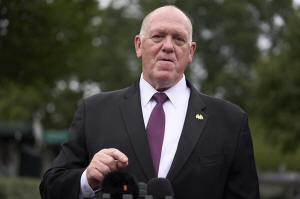Trump's big bill is powering his mass deportations. Congress is starting
to ask questions
[August 12, 2025]
By LISA MASCARO
WASHINGTON (AP) — President Donald Trump’s border czar Tom Homan visited
Capitol Hill just weeks after Inauguration Day, with other
administration officials and a singular message: They needed money for
the White House's border security and mass deportation agenda.
By summer, Congress delivered.
The Republican Party’s big bill of tax breaks and spending cuts that
Trump signed into law July 4 included what's arguably the biggest boost
of funds yet to the Department of Homeland Security — nearly $170
billion, almost double its annual budget.
The staggering sum is powering the nation's sweeping new Immigration and
Customs Enforcement operations, delivering gripping scenes of people
being pulled off city streets and from job sites across the nation — the
cornerstone of Trump's promise for the largest domestic deportation
operation in American history. Homeland Security confirmed over the
weekend ICE is working to set up detention sites at certain military
bases.
“We’re getting them out at record numbers,” Trump said at the White
House bill signing ceremony. “We have an obligation to, and we’re doing
it.”
Money flows, and so do questions
The crush of new money is setting off alarms in Congress and beyond,
raising questions from lawmakers in both major political parties who are
expected to provide oversight. The bill text provided general funding
categories — almost $30 billion for ICE officers, $45 billion for
detention facilities, $10 billion for the office of Homeland Security
Secretary Kristi Noem — but few policy details or directives. Homeland
Security recently announced $50,000 ICE hiring bonuses.
And it’s not just the big bill’s fresh infusion of funds fueling the
president's agenda of 1 million deportations a year.

In the months since Trump took office, his administration has been
shifting as much as $1 billion from the Federal Emergency Management
Agency and other accounts to pay for immigration enforcement and
deportation operations, lawmakers said.
“Your agency is out of control,” Sen. Chris Murphy, D-Conn., told Noem
during a Senate committee hearing in the spring.
The senator warned that Homeland Security would “go broke” by July.
Noem quickly responded that she always lives within her budget.
But Murphy said later in a letter to Homeland Security, objecting to its
repurposing funds, that ICE was being directed to spend at an
“indefensible and unsustainable rate to build a mass deportation army,”
often without approval from Congress.
This past week, the new Republican chairman of the House Homeland
Security Committee, Rep. Andrew Garbarino of New York, along with a
subcommittee chairman, Rep. Michael Guest of Mississippi, requested a
briefing from Noem on the border security components of the One Big
Beautiful Bill Act, or OBBBA, which included $46 billion over the next
four years for Trump’s long-sought U.S.-Mexico border wall.
“We write today to understand how the Department plans to outlay this
funding to deliver a strong and secure homeland for years to come,” the
GOP lawmakers said in a letter to the homeland security secretary,
noting border apprehensions are at record lows.
“We respectfully request that you provide Committee staff with a
briefing on the Department’s plan to disburse OBBBA funding," they
wrote, seeking a response by Aug. 22.
DHS Assistant Secretary Tricia McLaughlin said in a statement to The
Associated Press the department is in daily discussions with the
committee “to honor all briefing requests including the spend plan for
the funds allocated" through the new law.

[to top of second column]
|

White House border czar Tom Homan speaks with reporters at the White
House, Aug. 6, 2025, in Washington. (AP Photo/Evan Vucci, File)

“ICE is indeed pursuing all available options to expand bedspace
capacity,” she said. “This process does include housing detainees at
certain military bases, including Fort Bliss.”
Deportations move deep into communities
All together, it’s what observers on and off Capitol Hill see as a
fundamental shift in immigration policy — enabling DHS to reach far
beyond the U.S. southern border and deep into communities to conduct
raids and stand up detention facilities as holding camps for
immigrants.
The Defense Department, the Internal Revenue Service and other
agencies are being enlisted in what Kathleen Bush-Joseph, an analyst
at the Migration Policy Institute, calls a “whole of government”
approach.
“They’re orienting this huge shift,” Bush-Joseph said, as
deportation enforcement moves "inward."
The flood of cash comes when Americans' views on immigration are
shifting. Polling showed 79% of U.S. adults say immigration is a
“good thing” for the country, having jumped substantially from 64% a
year ago, according to Gallup. Only about 2 in 10 U.S. adults say
immigration is a bad thing right now.
At the same time, Trump's approval rating on immigration has
slipped. According to a July AP-NORC poll, 43% of U.S. adults said
they approved of his handling of immigration, down slightly from 49%
in March.
Americans are watching images of often masked officers arresting
college students, people at Home Depot lots, parents, workers and a
Tunisian musician. Stories abound of people being whisked off to
detention facilities, often without allegations of wrongdoing beyond
being unauthorized to remain in the U.S.
A new era of detention centers
Detention centers are being stood up, from “Alligator Alcatraz” in
Florida to the repurposed federal prison at Leavenworth, Kansas, and
the proposed new “Speedway Slammer” in Indiana. Flights are ferrying
migrants not just home or to El Salvador’s notorious mega-prison but
far away to Africa and beyond.
Homan has insisted in recent interviews those being detained and
deported are the “worst of the worst,” and he dismissed as “garbage”
the reports showing many of those being removed have not committed
violations beyond their irregular immigration status.

“There’s no safe haven here,” Homan said recently outside the White
House. “We’re going to do exactly what President Trump has promised
the American people he’d do.”
Back in February, Sen. Lindsey Graham of South Carolina, the
Republican chairman of the Budget Committee, emerged from their
private meeting saying Trump administration officials were “begging
for money.”
As Graham got to work, Republican Sen. Rand Paul of Kentucky, the
chairman of the Homeland Security and Governmental Affairs Committee
and a leading deficit hawk, proposed an alternative border package,
at $39 billion, a fraction of the size.
But Paul's proposal was quickly dismissed. He was among a handful of
GOP lawmakers who joined all Democrats in voting against the final
tax and spending cuts bill.
All contents © copyright 2025 Associated Press. All rights reserved |